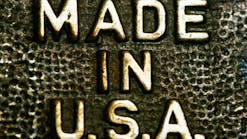By Ron Shinn
The Plastics Industry Association (PLASTICS) said across-the-board tariffs announced Wednesday by President Donald Trump will “disrupt supply chains, increase production costs and undermine our global competitiveness.”
Instead, Matt Seaholm, PLASTICS president and CEO, urged Trump to consider more targeted policies that take into account supply chains, promote investment and maintain growth in U.S. manufacturing.
Take a survey
How are tariffs affecting your business? Let us know.
Seaholm, in a news release, pointed out that in 2023, the U.S. plastics industry exported $74.2 billion in goods — more than it imported — resulting in a trade surplus of nearly $1 billion. The industry employs more than one million, Seaholm said.
The Washington, D.C. trade group represents the entire plastics supply chain, including equipment and material suppliers, processors and recyclers.
On Wednesday, Trump announced across-the-board 10 percent tariffs on all countries and 25 percent tariffs on imported cars. He also said some countries will be subjected to even higher tariffs because of high tariffs and other trade barriers they impose on the U.S.
Other trade groups criticized the new tariffs and predicted negative consequences.
"The blanket tariffs of 20 percent on all products from the EU announced by U.S. President Donald Trump will cause damage on both sides of the Atlantic,” said VDMA President Bertram Kawlath. “Punitive tariffs will not solve bilateral trade problems but will lead to a spiral of isolation. The EU will likely respond with counter-tariffs."
The VDMA represents 3,600 member companies in Germany and Europe, including companies that manufacture primary plastics processing machinery and auxiliary equipment.
“Sixty percent of our member companies stated that they would be very strongly or strongly affected by U.S. tariffs. The exact impact for the machinery sector is currently difficult to assess,” Kawlath said in a statement released Thursday. “Duties between the EU and the U.S. should not be increased but rather eliminated as they harm manufacturers and consumers in both regions.”
“As part of U.S. President Trump's plan to strengthen American industry, American companies will need to rely on foreign suppliers for certain key technologies,” he said. “In this regard, German and European machinery and plant engineering companies have been trusted and reliable suppliers for decades.”
The Recycled Materials Association (ReMA) said in a statement that it has “long supported free and fair trade policies. The imposition of new tariffs on our international trading partners will significantly disrupt U.S. manufacturing and recycling operations that depend on recycled material inputs.
“The U.S. recycled materials industry is a net exporter and supports nearly 600,000 jobs nationwide, with the exports of recyclables helping to reduce the U.S. trade deficit. U.S. recyclers rely on international market access to support their workforce and these new tariffs, and any retaliatory measures they may provoke, will only reduce the competitiveness of our industry and the manufacturers that rely on recycled materials.”
ReMA, based in Washington, D.C., represents more than 1,700 companies in the U.S. and 40 countries worldwide. It was formerly known as the Institute of Scrap Recycling Industries (ISRI).






